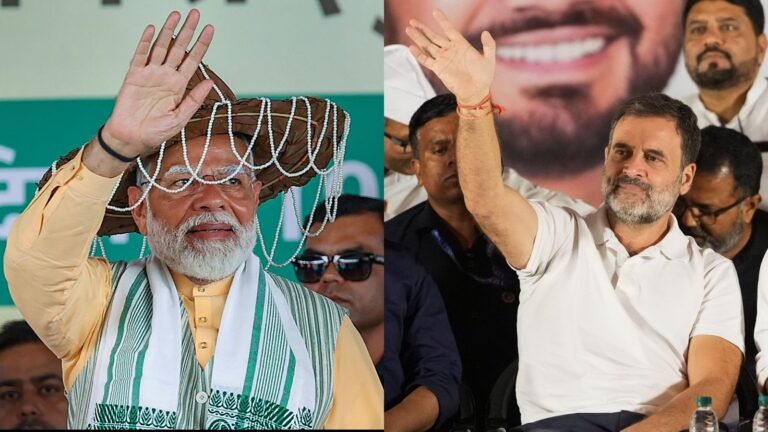As the BJP and opposition parties intensify their campaign rhetoric. Prime Minister Narendra Modi brings Ram temple There has been a recurring focus, with political parties across India’s blocs maintaining the Constitution and reservations as their main issues. Forty-nine constituencies across eight states and union territories are scheduled to vote in the fifth phase of the Lok Sabha elections on Monday.
As many as 35 assembly constituencies in Odisha will also go to polls at this stage.
The stakes are high for the Bharatiya Janata Party and its allies at this stage, when they have the smallest number of constituencies to vote. In the 2019 Sabah state election, only the Bharatiya Janata Party won 32 out of 49 seats. The undivided Shiv Sena, which was affiliated with the BJP at the time, had seven wins, while the JD(U) and LJP had one win each. In other words, the NDA at that time won 41 of these 49 seats.
The Congress won only one seat (Sonia Gandhi in Raebareli) while its allies won five seats (Trinamool Congress four and National Congress one). BJD won two seats.
In the fifth phase, the campaign will conclude in 25 states and union territories, covering 428 of the total 543 constituencies in Lok Sabha.

In 2019, seats going to polls in the fifth phase recorded an overall turnout of 61.82 percent. While his first three stages recorded a decline in turnout from the previous time, in the fourth stage the turnout in 96 constituencies was 69.16% for him, compared to 68.8% turnout in these seats in 2019. slightly exceeded.
In the first phase on April 19, when 102 constituencies voted, the final turnout was 66.14%, down from about 69.29% in 2019. In the second phase on April 26, when 88 seats voted, the final turnout was 66.71 percent, down from 69.43 percent in 2019. In the third phase on May 7, the final turnout in 93 constituencies was 65.68 percent, compared to 66.58 percent in 2019.

After Monday, with two more phases left, both the BJP and opposition parties have stepped up their attacks. Campaigning in West Bengal on Sunday, Prime Minister Narendra Modi accused the ruling Trinamool Congress of insulting Hindu faith to appease the vote bank, saying the infiltrators had disrupted the state’s demographics. He claimed that it was a “danger” for West Bengal as it was “increasing the number of people in the country”.
In Uttar Pradesh, Home Minister Amit Shah claimed that opposition leaders did not attend the consecration ceremony of the Ram temple in Ayodhya for fear of losing their vote bank.
Meanwhile, senior Congress leader Rahul Gandhi addressed Samajwadi Party chief Akhilesh Yadav at a rally in Prayagraj and said, “The battle is to protect the Constitution. I want to tell them that they cannot tear down the Constitution.”
The polls are key for the Congress as it seeks to win back the Amethi constituency from the BJP and retain the Raebareli seat from which Rahul is contesting. In Amethi, Union Minister Smriti Irani is aiming for her second consecutive victory.
Of the 49 seats, 14 are in Uttar Pradesh. Besides Amethi and Raebareli, it includes Faizabad, Lucknow, Mohanlalganj, Kaiserganj, Barabanki, Hamirpur, Banda, Fatehpur, Jhansi, Jalaun, Kaushambi and Gonda. The BJP had won 13 of these seats in 2019.
In Lucknow, Defense Minister Rajnath Singh is in the fray for the third time. Other ministers in the fray are Sadhvi Niranjan Jyoti from Fatehpur, Kaushal Kishore from Mohanlalganj and Bhanu Pratap Singh Verma from Jalaun.
The only seat that has been under discussion since the election was announced is Kaiserganj, where the BJP replaced sitting MP Brij Bhushan Sharan Singh, who has been accused of sexual harassment, with his son Karan.
Prime Minister Narendra Modi and Home Minister Amit Shah did not campaign in Kaiserganj.
In Maharashtra, 13 constituencies are scheduled to go to polls. Election campaigning in the state ends at this stage. Six of the 13 seats are in Mumbai.
In the constituencies of North West Mumbai, South Mumbai and South Central Mumbai, there was a direct showdown between Chief Minister Eknath Shinde’s Shiv Sena and Uddhav Thackeray’s Shiv Sena (UBT). In 2019, the Bharatiya Janata Party-Shiv Sena alliance won these three seats along with Mumbai North East, Mumbai North Central and Mumbai North.
In Mumbai North, a seat it had won twice in the past, the BJP has fielded Union Minister Piyush Goyal, who is making his parliamentary election debut. Opposing him is Bhushan Patil, deputy speaker of the Mumbai Congress. In north-central Mumbai, there will be another violent clash between former public prosecutor Ujjwal Nikkam, who handled high-profile cases such as the Ajmal Kasab trial, and Mumbai Congress president Varsha Gaikwad.
Apart from UP and Maharashtra, seven seats in West Bengal, five each in Odisha and Bihar, three in Jharkhand and one each in J&K and Ladakh will go to polls on Monday. Of the five seats in Bihar, Saran will be contested by party president Lalu Prasad’s daughter Rohini Acharya, who made her debut from the RJD, and Rajiv Pratap Rudy, the incumbent BJP MP who has won many times in the constituency. We are witnessing a high-profile tussle with Union ministers.
In J&K, the only seat in Baramulla, which will go to polls tomorrow, will decide the electoral fate of National Congress leader Omar Abdullah. Opposing him are former minister Sajjad Lone, a separatist-turned-politician and chairman of the People’s Conference, and jailed Awami Ittihad leader and former MLA Abdul Rashid Sheikh, alias Engineer. This is Mr. Rashid.

